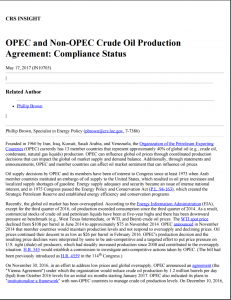Full Title: OPEC and Non-OPEC Crude Oil Production Agreement: Compliance Status
Author(s): Phillip Brown
Publisher(s): Congressional Research Service
Publication Date: May 1, 2017
Full Text: Download Resource
Description (excerpt):
Founded in 1960 by Iran, Iraq, Kuwait, Saudi Arabia, and Venezuela, the Organization of the Petroleum Exporting Countries (OPEC) currently has 13 member countries that represent approximately 40% of global oil (e.g., crude oil, condensate, natural gas liquids) production. OPEC can influence global oil prices through coordinated production decisions that can impact the global oil market supply and demand balance. Additionally, through statements and announcements, OPEC and member countries can affect oil market sentiment that can influence oil prices. Oil supply decisions by OPEC and its members have been of interest to Congress since at least 1973 when Arab member countries instituted an embargo of oil supply to the United States, which resulted in oil price increases and localized supply shortages of gasoline. Energy supply adequacy and security became an issue of intense national interest, and in 1975 Congress passed
Oil supply decisions by OPEC and its members have been of interest to Congress since at least 1973 when Arab member countries instituted an embargo of oil supply to the United States, which resulted in oil price increases and localized supply shortages of gasoline. Energy supply adequacy and security became an issue of intense national interest, and in 1975 Congress passed the Energy Policy and Conservation Act (P.L. 94-163), which created the Strategic Petroleum Reserve and established energy efficiency and conservation programs.
